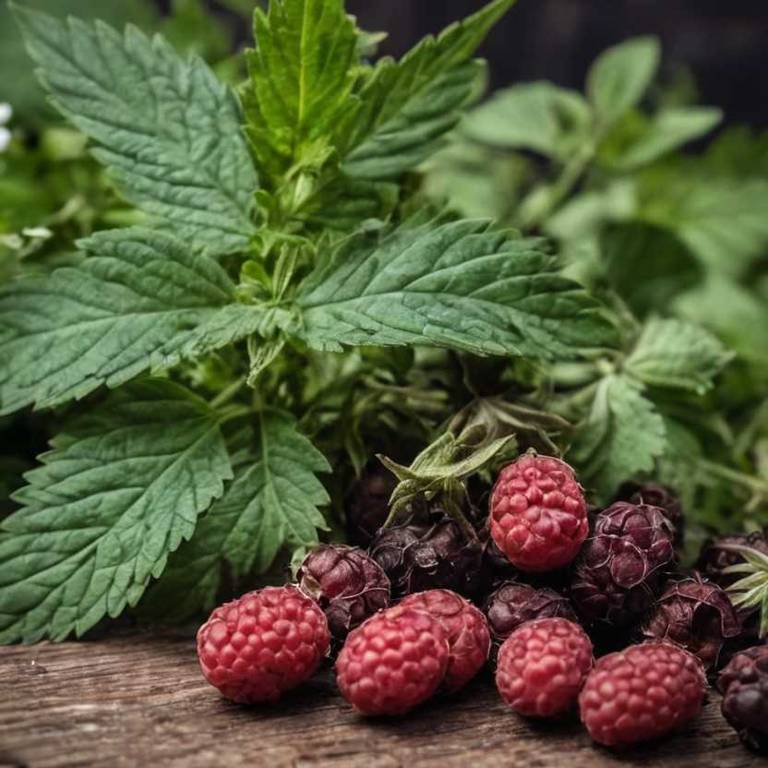10 Best Rubus Fruticosus Health Benefits

Rubus fruticosus, commonly known as blackberry bramble, offers a variety of health benefits due to its rich nutrient profile.
This plant is a good source of dietary fiber, which aids in digestion and helps maintain a healthy gut. It also contains antioxidants such as anthocyanins, which can help reduce inflammation and protect cells from oxidative stress. The berries are packed with vitamins C and K, supporting immune function and blood clotting.
Additionally, the leaves of Rubus fruticosus have been traditionally used in herbal medicine for their potential diuretic and anti-inflammatory properties.
1. Boosts immunity
Rubus fruticosus boosts immunity by providing a rich source of antioxidants, which help neutralize harmful free radicals in the body.
These antioxidants, such as anthocyanins and ellagic acid, support the immune system's ability to defend against infections and diseases. The plant also contains vitamins C and E, which are known to enhance immune function and reduce inflammation. Additionally, the presence of polyphenols in Rubus fruticosus may promote the production of white blood cells, further strengthening the body's defenses.
Regular consumption of Rubus fruticosus can therefore contribute to a more resilient and effective immune system.
2. Reduces inflammation
Rubus fruticosus reduces inflammation by containing bioactive compounds such as anthocyanins and flavonoids, which have potent anti-inflammatory properties.
These compounds help inhibit the production of pro-inflammatory cytokines and reduce oxidative stress in the body. Studies suggest that the berries and leaves of Rubus fruticosus can be used topically or consumed to alleviate symptoms of inflammatory conditions like arthritis and skin irritations. The anti-inflammatory effects of Rubus fruticosus make it a valuable natural remedy for managing chronic inflammation.
Incorporating Rubus fruticosus into a balanced diet or using it in topical applications may offer significant health benefits for individuals suffering from inflammatory disorders.
3. Improves digestion
Rubus fruticosus improves digestion by containing dietary fiber that promotes healthy bowel movements and prevents constipation.
The plant also contains compounds that may stimulate the production of digestive enzymes, aiding in the breakdown of food more efficiently. Its anti-inflammatory properties can help reduce gastrointestinal discomfort and support overall gut health. Additionally, the presence of antioxidants in Rubus fruticosus may protect the digestive tract from oxidative stress.
Regular consumption of this plant may contribute to a more balanced and efficient digestive system.
4. Supports heart health
Rubus fruticosus supports heart health by providing essential nutrients that contribute to cardiovascular function.
It contains antioxidants and polyphenols that help reduce oxidative stress and inflammation, both of which are linked to heart disease. The plant's high levels of potassium and magnesium support healthy blood pressure regulation. Additionally, its fiber content may help lower cholesterol levels, further promoting cardiac well-being.
Regular consumption of Rubus fruticosus may therefore play a role in maintaining a healthy heart and reducing the risk of cardiovascular disorders.
5. Enhances skin health
Rubus fruticosus enhances skin health by providing essential nutrients that support the skin's natural repair processes.
Its high concentration of antioxidants, such as vitamin C and polyphenols, helps neutralize free radicals that can damage skin cells and accelerate aging. The anti-inflammatory properties of Rubus fruticosus may also reduce redness and irritation, promoting a more even skin tone. Additionally, its ability to stimulate collagen production can improve skin elasticity and firmness.
Overall, incorporating Rubus fruticosus into one's diet or skincare routine may lead to healthier, more radiant skin.
6. Promotes weight loss
Rubus fruticosus promotes weight loss by enhancing metabolic activity and increasing calorie expenditure.
This plant contains bioactive compounds such as polyphenols and flavonoids that may help regulate appetite and reduce fat absorption. Studies suggest that consuming Rubus fruticosus can support the body's natural ability to burn fat more efficiently. Additionally, its high fiber content can help promote a feeling of fullness, reducing overall food intake.
As a result, incorporating Rubus fruticosus into a balanced diet may contribute to effective weight management.
7. Aids in detoxification
Rubus fruticosus aids in detoxification by supporting the liver's natural processes through its rich content of antioxidants and bioactive compounds.
These components help neutralize harmful free radicals and reduce oxidative stress, which can impair liver function. The plant also contains compounds that may enhance the body's ability to eliminate toxins, promoting overall metabolic health. Its traditional use in herbal medicine aligns with its potential role in supporting the body's detox systems.
Regular consumption of Rubus fruticosus may contribute to maintaining a healthy internal environment by assisting in the removal of toxins from the body.
8. Improves mental clarity
Rubus fruticosus improves mental clarity by containing bioactive compounds that support cognitive function.
These compounds may enhance neural communication and reduce oxidative stress in the brain. Regular consumption of Rubus fruticosus has been associated with improved focus and reduced mental fatigue. Its antioxidant properties help protect brain cells from damage caused by free radicals.
As a result, it may contribute to better memory retention and overall mental sharpness.
9. Strengthens bones
Rubus fruticosus strengthens bones by providing essential nutrients that support bone density and structural integrity.
This plant contains high levels of calcium, magnesium, and other minerals that are crucial for maintaining strong and healthy skeletal systems. Its rich content of antioxidants also helps reduce inflammation and oxidative stress, which can weaken bones over time. Regular consumption of Rubus fruticosus may contribute to preventing conditions like osteoporosis and promoting overall skeletal health.
As a natural remedy, it offers a valuable dietary supplement for those seeking to enhance their bone strength through nutrition.
10. Regulates blood sugar
Rubus fruticosus regulates blood sugar by containing bioactive compounds that enhance insulin sensitivity and promote glucose uptake in cells.
The plant's polyphenols and flavonoids may help reduce postprandial glucose spikes, supporting stable blood sugar levels. Studies suggest that regular consumption of Rubus fruticosus may improve glycemic control in individuals with diabetes. Its antioxidant properties also contribute to reducing oxidative stress, which is often linked to metabolic disorders.
As a result, incorporating Rubus fruticosus into a balanced diet could be a natural aid in managing blood sugar levels.